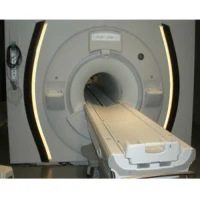A new technology that includes the use of metamaterials can make MRI scans quicker, more accurate and safe for patients, according to a new study published in the journal Advanced Materials. Researchers from ITMO University and other institutions demonstrated that the quality of MRI images could be enhanced with the aid of metamaterials — artificial periodic structures that can interact with electromagnetic radiation in an extraordinary fashion.
Placing a layer of metamaterials onto the bed of the scanner increases the signal-to-noise ratio in the scanned area. The result of this increase is that either a higher resolution image can be obtained over the same time slot or faster examination can be performed with the same resolution as in an ordinary MRI scanner, the researchers explain.
In addition, the metamaterial suppresses the electric field, which is responsible for tissue heating, a phenomenon that may compromise the safety of the whole MRI procedure. The problem of tissue heating has recently become even more relevant with the arrival of high-field and ultra-high-field MRI scanners in the medical practice. Tissue heating becomes substantial at higher fields due to an increase of the radiofrequency energy absorption.
Using the new technique, the researchers managed to avoid tissue heating — at the same time preserving high resolution. The solution, in essence, does not require any intervention into the hardware of the MRI scanner, but rather represents an inexpensive functional add-on device that can be used with any existing MRI scanner.
"Our metamaterial can be embedded directly into the patient table of any commercially available MRI scanner. However, in the future we see even more potential in the concept of special smart clothing for MRI scanning," says the study's first author Alexey Slobozhanyuk, a researcher at the International Laboratory of Applied Radiophysics at ITMO University. Stripes of metamaterial could be sewn into clothes worn by patients, which would lead to higher resolution MRI images, he explains.
In ordinary MRI devices, the scanning may last from 15 to 60 minutes and during this time the patient must remain completely immovable. The new technology has the potential to reduce MRI scanning times by more than 50 percent, making the procedure more comfortable for the patient, as well as reducing queue time in hospitals.
"Our idea of using metamaterials in order to receive images with higher detalisation will allow doctors to localise and study oncological diseases," says co-author Yuri Kivshar, who heads the Nonlinear Physics Centre at the Australian National University. "Based on the images obtained with an MRI scanner, the surgeon determines the structure of the inflammation, which afterwards will serve as a blueprint for his scalpel during the operation."
The patent-pending technology is currently being co-developed by MediWise, a UK-based company that specialises in commercialising metamaterials for medical applications.
Source: ITMO University
Image credit: Advanced Materials
Placing a layer of metamaterials onto the bed of the scanner increases the signal-to-noise ratio in the scanned area. The result of this increase is that either a higher resolution image can be obtained over the same time slot or faster examination can be performed with the same resolution as in an ordinary MRI scanner, the researchers explain.
In addition, the metamaterial suppresses the electric field, which is responsible for tissue heating, a phenomenon that may compromise the safety of the whole MRI procedure. The problem of tissue heating has recently become even more relevant with the arrival of high-field and ultra-high-field MRI scanners in the medical practice. Tissue heating becomes substantial at higher fields due to an increase of the radiofrequency energy absorption.
Using the new technique, the researchers managed to avoid tissue heating — at the same time preserving high resolution. The solution, in essence, does not require any intervention into the hardware of the MRI scanner, but rather represents an inexpensive functional add-on device that can be used with any existing MRI scanner.
"Our metamaterial can be embedded directly into the patient table of any commercially available MRI scanner. However, in the future we see even more potential in the concept of special smart clothing for MRI scanning," says the study's first author Alexey Slobozhanyuk, a researcher at the International Laboratory of Applied Radiophysics at ITMO University. Stripes of metamaterial could be sewn into clothes worn by patients, which would lead to higher resolution MRI images, he explains.
In ordinary MRI devices, the scanning may last from 15 to 60 minutes and during this time the patient must remain completely immovable. The new technology has the potential to reduce MRI scanning times by more than 50 percent, making the procedure more comfortable for the patient, as well as reducing queue time in hospitals.
"Our idea of using metamaterials in order to receive images with higher detalisation will allow doctors to localise and study oncological diseases," says co-author Yuri Kivshar, who heads the Nonlinear Physics Centre at the Australian National University. "Based on the images obtained with an MRI scanner, the surgeon determines the structure of the inflammation, which afterwards will serve as a blueprint for his scalpel during the operation."
The patent-pending technology is currently being co-developed by MediWise, a UK-based company that specialises in commercialising metamaterials for medical applications.
Source: ITMO University
Image credit: Advanced Materials
Latest Articles
healthmanagement, MRI, MRI scans, radiation, tissue heating, electric field, metamaterials
A new technology that includes the use of metamaterials can make MRI scans quicker, more accurate and safe for patients, according to a new study published in the journal Advanced Materials. Researchers from ITMO University and other institutions demonstr










